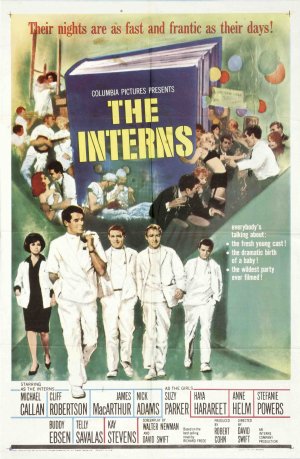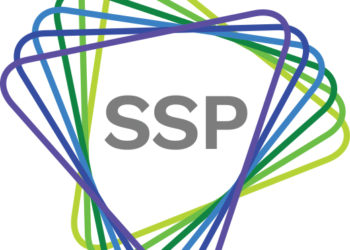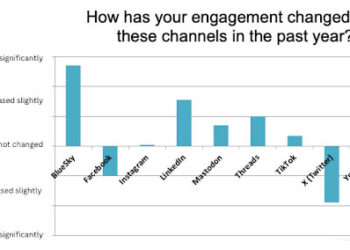
Editor’s Note: This post is by Emma Brink. Emma is an Assistant Editor at Wiley. A past SSP Early Career grant winner, she currently serves on SSP’s Professional Development Committee and co-chairs SSP’s Early Career Task Force. You can attend her panel, “The Future of Scholarly Communication According to the Professionals Who Will Shape It” at this year’s SSP Annual Meeting in May.”
After my ten month internship at Wiley, my mother sent me this link on the Huffington Post: “17 Incredibly Successful People Who Started as Interns”. It came with a typical message of motherly affection: “See? Wasn’t it all worth it?” Eventually we realize our mothers are always right.
I started as an Editorial intern in Wiley’s Health Sciences journals program in October 2012. After graduating with an English Literature degree in May 2012, I spent months looking for jobs, any job, in publishing. Truthfully, I didn’t even consider internships as an employment possibility. All of my friends had jobs lined up post-graduation, and I felt insecure for not having my life “figured out.” I decided instead to settle on a location and go from there, so I moved to Boston and stumbled across a paid, full-time Editorial internship at Wiley. I spent ten months interning in the same department where I work now as an Assistant Editor.
I cannot say enough good things about my internship experience. There was nothing “Devil Wears Prada” about it. I was not asked to make coffee or pick up anybody’s lunch. I was not asked to make endless copies or manage anyone’s travel. I was treated like a full-fledged employee, and better yet, my internship was treated as educational experience. Everyone made sure to answer all of my questions, to stop by after meetings and presentations and break down what was discussed. It was a group effort to make sure I was fully integrated into the team and the company. I’ve heard that many publishing companies do not offer formal training programs, so my internship was an opportunity for a crash course on all things Wiley.
Internships are a great opportunity to be introduced to the publishing industry and an entry point into a company that interests you. I wish I had considered them sooner! But internships offer more than just a foot in the door. They provide real, hands-on experience in a specific field without the full employment commitment. You can take the time to think, is this really what I want to do? Am I enjoying this work? Should I look in another direction? You also get the chance to familiarize yourself with the company and the people before becoming a regular employee. This will give you the best sense of whether the company is the right fit, which you can rarely tell from an interview.
An internship will also help you understand whether your strengths and skills are the best match for the company. Are your talents helping the company? Does this work make you feel fulfilled? Could your talents be best used elsewhere? More than direction and experience, internships also provide you with confidence. If you really take advantage of the value and educational opportunity of your internship, you can use the knowledge you’ve gained to position yourself as the best candidate for open positions. After an internship, the assimilation phase that comes with a new job shrinks to almost nothing because you already feel like part of the team and have a clear grasp on what you’re doing.
Yes, internships are often unpaid (and even when they are, it’s no salary). But internships are a great résumé-builder, especially in publishing. More than that, companies seemingly love to hire interns because of all the skills, knowledge, and experience their interns have already gained. When I look around at my team and friends at Wiley, almost half of them started as interns. And it’s worth it. It’s a small sacrifice financially for the potential of a great career. And besides, Ramen is delicious!
For employers who are looking to hire interns, I really valued the considerable thought put into the structure of my internship program. Aside from training, my colleagues took the time to outline the organization of the company, define industry terms, offer outside reading, break out after presentations and meetings to explain why the topic is important, and introduce me to the wider office. My internship program offered meals with different departments, guest speaker lunch events, and résumé and cover letter writing training. These tools and experiences are worthy investments when they provide your company with a fully-trained, knowledgeable, and enthusiastic employee right off the bat. An ideal internship is ultimately an educational experience, so be a teacher. In short, ask not what your interns can do for you, but what you can do for your interns! Consider how you can provide the best experience for them.
There are several benefits to offering an internship program at your company. Interns provide more than cheap (or free!) labor. Interns are trying their mightiest to get that job, so they will come to work for you with an enthusiastic attitude, eager work ethic, and genuine interest in the company. Often this interest leads to great loyalty to the company that jumpstarted their career. Interns also ask challenging questions. Because it’s meant to be an educational experience, interns are generally encouraged to be thoughtful about the work they are doing and ask questions about the business. This in turn forces you, as the employer and role model, to provide equally thoughtful answers. This may challenge you to think about your work in a different way and reflect on its value.
Now, how to find each other! If you are a job seeker looking for an internship in publishing, they are out there! And many companies offer multiple internships across various departments. SSP, of course, has an internship page that posts a wide range of internship offerings in scholarly communication. This is a great place to start and see what companies are in the internship arena. Some other valuable sites to search include:
You can also look at local job posting sites, which is how I found my internship at Wiley (Bookbuilders of Boston). Another great way to search is to start with the company. If you are interested in a specific company, head over to their Careers site and look at their job board. If you are truly interested in that company, saying so helps!
If you are an employer, being visible and advertising your internship program as broadly as possible will really help those looking to find you. Posting internship positions on multiple sites, not just your own, will help attract the brightest pool of candidates. Ultimately this will help you just as much as it will help your applicants. Once you have found each other, everybody wins!
Discussion
10 Thoughts on "Guest Post: Emma Brink on Internships: Where Everybody Wins!"
Yes, internships are often unpaid (and even when they are, it’s no salary). But internships are a great résumé-builder, especially in publishing.
I wish employment law would change in the United States where it becomes illegal to hire someone without pay. To me, unpaid internships only help those who can afford to support themselves (or be supported by their parents) while they build their resumes. The result is to widen the experience gap, giving those who are already financially independent a head-start when they look for full-time salaried positions.
As a matter of fact, it *is* illegal to hire someone without pay in the States, at least for for-profit corporations (see here for more on the “Black Swan” case: http://bit.ly/1CF16SB). The fact that it still happens, however…
It’s great that this internship worked out, but I would like to call attention to the fact that such things as running errands and making travel arrangements are in fact tasks of full-fledged employees. They may not be the tasks of people with professional qualifications, but they are important functions, which are provided by people who may for any number of reasons not be candidates for tasks and functions higher up the ladder. It’s not a matter of “real” employees and “false” employees (that is the stuff of the academy, with its small army of adjuncts) but of employees of different grade. The real lesson of “The Devil Wears Prada” is not how horrible it is to be the assistant to an Anna Wintour-type but the undesirability of turning into another Wintour.
If you are a student at a university that operates a press, chances are that you have an opportunity right on your own campus to be an intern for that press. At Penn State when I was director we had a half-dozen undergraduate interns working for us at any given time. Some even got course credit for their work at the press with the English Department. These positions were usually unpaid, but as students their living costs were being paid anyway. The press considered training such students as part of its mission, indeed even to the extent of including mention of it in its formal mission statement. We sent many of these interns on to successful careers at other publishing companies later, while a few remained on our staff and rose to positions of considerable responsibility. I agree with everything Ms. Brink says about the value of this kind of training, but it doesn’t have to wait until you have already graduated from college.
Not to rain on anyone’s parade, but my own internship experience could have hardly differed more.
After completing my doctoral coursework, figuring out I really did not want to work on a dissertation topic my department would let me work on, and just getting burned out on the academic lifestyle—the uncertainty and lack of control over your own life gets old after a while—I started working as an unpaid editorial intern at a nonprofit scholarly press. During the three years I worked there, I eventually took charge of the peer review process for our two most significant subject areas (just over half the books we published each year), negotiating rights contracts with foreign publishers, drafting briefs and summaries of projects for our editorial committee, and sometimes seeking and referring promising manuscripts I heard about to the press. It was, to say the least, a bit more than just fetching coffee.
And yet, despite being unpaid (well, aside from occasional free books and a few side projects a former editor would give me), it fell victim to our sponsoring institution’s budget restrictions when HR pointed out that, if I was to keep working, I’d have to be formally hired and paid…which they didn’t have the money for. So I was let go, told that at least I had the part-time job I’d also been working to fall back on.
And yes, over those three years, I applied for every job I was even remotely qualified for. Networked, took part in the local publisher’s association, and read everything I could find. Found out after most interviews that there had been an internal candidate, and my own day-long interviews were basically formalities.
So, after three years of, in the words of one interview committee, doing work beyond the responsibilities of the EA positions I was applying for, I was never able to land an entry level EA job.
So it goes.
Interns should be paid – they are working, and they should be paid. I don’t think most of the people on this list dispute that. The real problem here is that these “internships” used to be “entry level jobs.” They were a chance to get some experience, learn an organization and industry, and begin a career.
When internships work well, they are indistinguishable from a “first job”. Emma was “hired” – did a good job, learned quickly and well, took on more responsibility, and got “promoted.” Why does that have to be an internship, a continued state of insecurity – rather than a real job with benefits and a 401k right from the start?
Whether you are starting out or starting in a new direction – everyone needs a first chance.
I assume you would agree that college students who are doing internships during their time in college don’t need to be paid, especially if they are getting course credit–unless they are doing the internships in place of another summer job and need to earn money then.
Sandy – I do think interns should be compensated for their work. It is tricky when the “internship” is for-college-credit; it could be argued that the credit towards graduation is compensation. I haven’t got much experience on that point – my intern was paid and the work was not related to his course of study. It was just a part time job. In fact, my comment was directed to the fact that I don’t see why it needed to be called an “internship” instead of “a part time job.”
I’ve known 3 people at 2 companies that had full time entry level publishing jobs and worked another job part time to supplement their income. I don’t think the problem ends with internships. There is a glut of lower level people that want to do publishing and not enough jobs, and it depresses working conditions.
Who needs money, when you could get paid in confidence?



